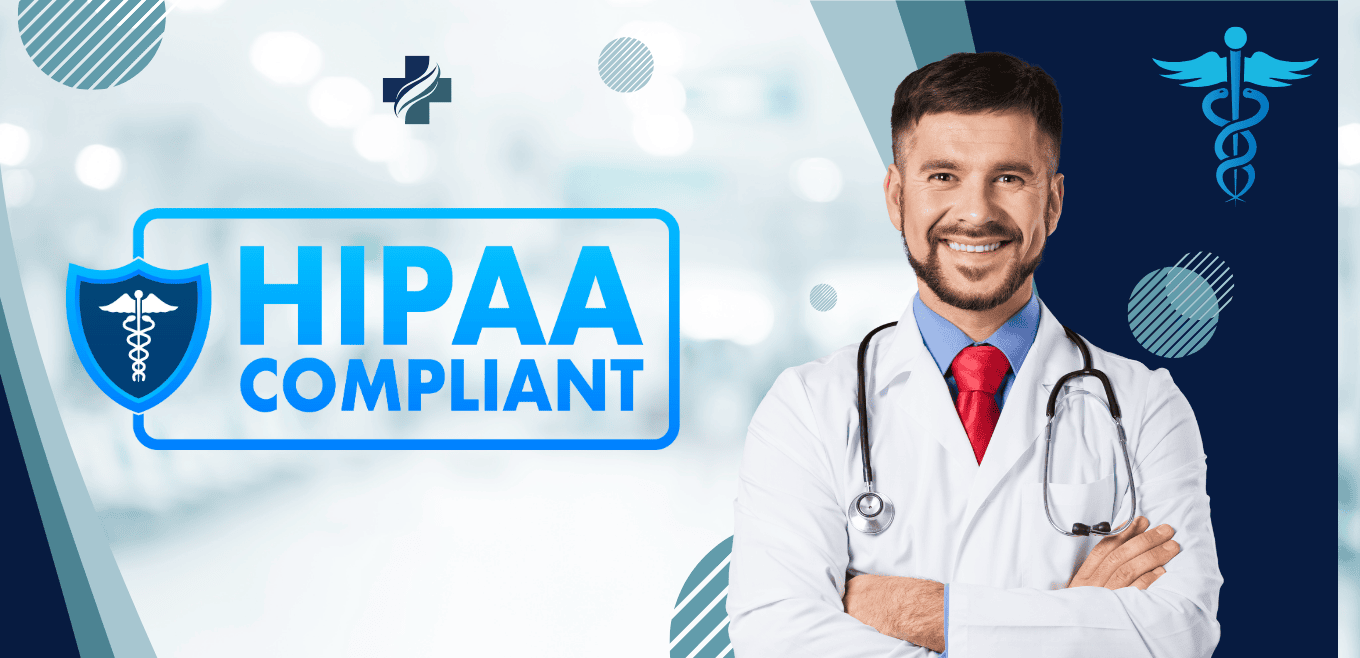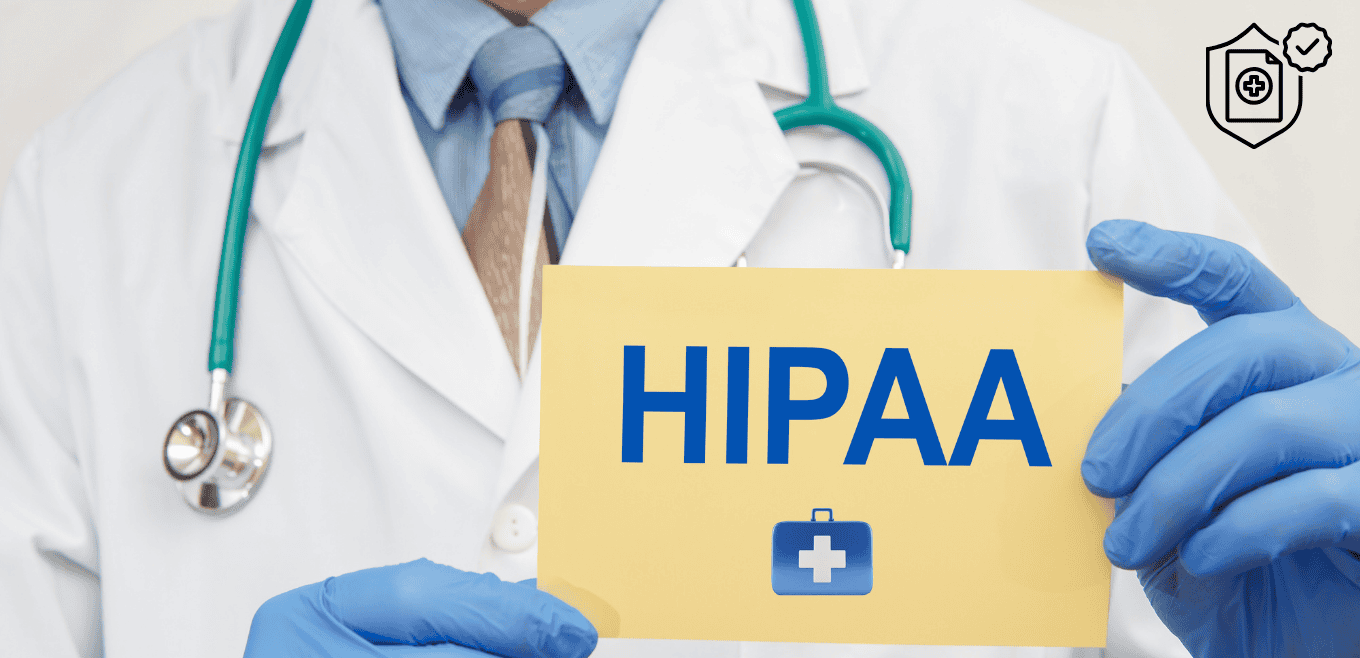According to market research, the mHealth mobile application is anticipated to grow to $269.31 billion by 2032.
With the increase in the number of healthcare mobile application in the market, tech companies should often check how the data is gathered and stored. If you are just beginning the process of developing a healthcare app, you need to know what “HIPAA compliance” means.
Well, balancing the scales of innovation with the weights of HIPAA regulations can feel like walking on a tightrope, blindfolded without a safety net. So, what’s the solution?
Now that is the reason we are here. So, if you want to avoid any legal consequences or secure data stay on this blog. We will also understand how to develop HIPAA-compliant healthcare apps.
What is HIPAA?
When handling and storing patient data, particularly on a software platform, the HIPAA Act ensures that privacy and security standards are met. This includes safeguarding sensitive information related to patient billing and health insurance coverage.
In 1996, the concept of creating mobile apps compliant with HIPAA regulations was introduced to control patient data protection, reduce healthcare expenses, and offer health insurance to individuals who had lost or changed jobs. 2013 saw the last update to the act. But the part of the act that interests us as developers and you as healthcare organizations is the one about making sure the app safeguards users from data fraud.
The first part of understanding and implementing the HIPAA Regulation Compliance Act is to know what data the healthcare software interacts with.
Protected Health Information (PHI):
PHI consists of data that can be used to identify a person’s health status or treatment, such as medical records, payment details, and conversations with healthcare providers.
For example, a healthcare app must abide by HIPAA to protect PHI if it stores a patient’s lab results, treatment plans, and medical history.
Confidential Health Information (CHI):
Confidential Health Information (CHI) is any health-related information gathered by non-traditional organizations, such as fitness trackers or wellness applications. It addresses diet, exercise regimens, and even heart rate monitoring.
Once you have a clear understanding of the data, acknowledge the important role that HIPAA plays in protecting private health information. Maintaining adherence to HIPAA regulations safeguards people’s security and privacy while fostering confidence between medical professionals and patients.
What is the importance of HIPAA compliance?
HIPAA compliance is a cornerstone in healthcare software development, ensuring that healthcare providers and patients benefit from secure and trustworthy digital health solutions.
For Healthcare Facilities:
- Legal compliance: Prevents fines and penalties for noncompliance.
- Data security: Ensuring strong protection against data breaches.
- Patient trust: Creates and preserves faith in the services provided by the facility.
- Operational integrity: Secure data handling streamlines processes.
- Reputation management: safeguards the healthcare facility’s standing in the community.
For Patients:
- Privacy Assurance: Assures that private health information will remain private.
- Data Control: Gives patients authority over the information about their health.
- Enhances confidence in healthcare services and providers.
- Access to Care: Enables safe access to remote monitoring and telehealth.
- Enables patients to make well-informed decisions about their health by providing them with safe data access.
Tips to make your healthcare mobile application HIPAA-compliant
Developing a HIPAA-compliant software can cost a lot of investment. Follow these tips to ensure your app adheres to HIPAA standards and safeguards sensitive consumer health information, which helps avoid costly penalties.
Consult with experts
HIPAA regulations can be intricate and dynamic. Seek advice from legal professionals who focus on healthcare privacy laws to make sure you fully comprehend the most recent regulations. Collaborate with HIPAA-certified compliance officers who can offer guidance on how to put in place the proper technical, administrative, and physical security measures.
Think about collaborating with cybersecurity companies that specialize in HIPAA compliance or healthcare IT consultants. These companies can carry out thorough risk assessments, create tailored compliance plans, and offer your team continuing assistance and training.
Assess patient information
Make a comprehensive data mapping exercise to determine every kind of patient data that your app gathers, uses, or keeps. Ascertain which of your app’s data elements are PHI and need to be compliant with HIPAA. Implement protocols, such as access controls and encryption measures, to properly classify and handle PHI.
Find third-party solutions that comply with HIPAA
Make sure any third-party services or vendors your app integrates with are HIPAA-compliant if they are used for tasks like data analytics, cloud storage, or payment processing. Examine their data handling procedures, security protocols, and compliance certifications in detail.
Examine their PHI security policies and practices, including encryption methods, access restrictions, and breach reporting procedures. To specify their obligations regarding the protection of PHI, think about entering into Business Associate Agreements (BAAs) with these organizations.
Do you want to improve scalability by 40%?
View our case study to understand how People10 revolutionized a Telehealth platform adhering to HIPAA and PHI regulations.
Safeguard sensitive data
Put strong security measures in place to safeguard PHI at every stage of its existence. Use industry-standard encryption algorithms, like AES-256 or higher, to protect data both in transit (transmitted over networks) and at rest (stored on servers or other devices).
Limit access to sensitive data by enforcing strong access controls, such as role-based permissions, multi-factor authentication, and frequent password changes. When sending PHI over the internet, use secure communication protocols like HTTPS and TLS.
Implement an audit mechanism
Provide an auditing system to monitor and record all PHI-related actions taken within your application. It includes documenting the identities of the people involved and the precise actions done, in addition to tracking when PHI is accessed, altered, or transmitted.
To gather and examine audit logs from multiple sources, including databases, network devices, and applications, use centralized logging and monitoring systems. Frequent audits can facilitate quick investigation and response in addition to helping to identify possible breaches.
Remove PHI from emails and notifications
PHI should not be included in emails, notifications, or other correspondence unless necessary and secure. If PHI must be included, make sure the communication channel is encrypted and meets HIPAA requirements.
Use end-to-end encrypted secure messaging systems that offer safe channels for sharing protected health information. Educate your users on the dangers of using unsecured channels and how to handle PHI in communications.
Which healthcare mobile application should comply with HIPAA rules?
HIPAA regulations should be followed by any healthcare app that uses PHI, including telemedicine, electronic health records (EHR), patient portals, and medical device apps.

To compare your application to compliance, you must evaluate three key elements:
- Entity:
Entities include businesses or people who access PHI and engage in healthcare transactions. Their HIPAA legal obligations are determined by their classification. HIPAA compliance is necessary for two entities.
- Covered entities: Healthcare providers (such as hospitals, clinics, and solo practitioners), health plans (such as HMOs and government healthcare programs), and clearinghouses that directly handle patient data and are obligated to adhere to HIPAA’s privacy and security regulations are all considered covered entities.
- Business associates: Businesses or people who work with covered entities to provide services or carry out tasks involving the use or disclosure of protected health information (PHI) are known as business associates. Examples include cloud storage providers, IT support companies, and third-party billing companies.
2. Data:
Healthcare apps’ need to abide by HIPAA regulations is greatly impacted by the kind of data they manage. PHI, which includes individually identifiable health information, is governed by HIPAA regulations that impose strict privacy and security requirements.
3. Security:
HIPAA compliance for healthcare apps is largely dependent on security measures, especially when it comes to safeguarding electronic protected health information (ePHI). Protected health information that is transmitted, maintained, or stored electronically is referred to as ePHI.
After identifying the healthcare apps that need to adhere to HIPAA regulations, it’s crucial to comprehend the essential features needed for compliance. These features are essential for maintaining confidentiality and protecting sensitive patient data.
Looking to build a HIPAA-compliant mobile app for your healthcare business?
We can help you stay compliant with all the key features for a scalable and reliable healthcare app.
Common features of a HIPAA compliant mobile application
Although there are differences between healthcare apps and other mobile application categories. Nonetheless, a few features are shared by all HIPAA-compliant apps.
- Data anonymization: For software development to be HIPAA compliant and safeguard patient privacy, data anonymization is essential. To prevent patient identity from being identified, this procedure encrypts or removes personal identifiers from medical records. Healthcare organizations can securely use patient data for research, analysis, and other purposes without jeopardizing privacy or breaking HIPAA rules by anonymizing the data.
- User identification: The best course of action for user authentication when utilizing the HIPAA compliance mobile app is to request a password or PIN from them. Additionally, you can enhance the functionality by integrating smart cards and biometric identification.
- Access in an emergency: Network conditions and critical services may be disrupted during natural disasters. Even though making plans for these situations is not strictly necessary, it would be wise to intentionally include a clause that deals with these problems.
- Encryption: For security reasons, the data that is transferred or stored needs to be encrypted. End-to-end encryption is offered by services like Google Cloud and AWS, which make use of Transport Layer Security 1.2. Although TLS might be adequate, it is recommended to enhance its security by utilizing Advanced Encryption Standard (AES) encryption.
It takes careful integration of these fundamental features to develop an mobile application that complies with HIPAA regulations, which is a complex process. Collaborating with a trustworthy healthcare app development company will enable you to create an app that complies with HIPAA regulations while maintaining the highest levels of quality and security.
People10 ensures HIPAA compliance in mobile application development
The framework for providing the privacy, accuracy, and security of patient health information is offered by HIPAA. Today, there is an increasing volume of digital health data, and HIPAA compliance is essential to safeguarding private patient data from breaches and illegal access. However, respecting HIPAA regulations preserves legal and ethical norms while also promoting patient-provider confidence.
It takes more than just standard mobile application development expertise to create HIPAA-compliant apps. It requires an extensive knowledge of HIPAA and a systematic strategy to guarantee compliance at every stage of development.
Partner with People10 today to take the first step towards a secure and compliant HIPAA-approved mobile application. We help you create healthcare apps that align with HIPAA standards and patients’ security concerns.
Author
Shrutha Sekharaiah brings over 13 years of experience in delivering innovative, scalable solutions. His broad expertise in technology and focus on collaboration and mentorship drive the creation of robust systems enhancing efficiency and performance.



